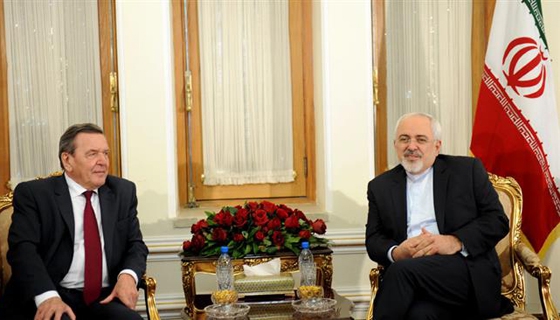Iran’s minister of industry, trade, and mines has said Iran and Germany will work to boost joint ventures in Iranian and German markets.
Mohammadreza Nematzedeh and former German Chancellor Gerhard Schroeder met in Tehran on Tuesday to discuss bilateral trade and joint ventures. “Our government and nation has always been promoting peace and friendship in the region and the world; the visit by German delegation provides a proof of this; we will be much pleased to improve relations to better levels than in the past, and in this vein, we have prioritized plans of long-term partnership in joint ventures to cope with new conditions created in times post-JCPOA,” Mr. Nematzedeh told Schroeder.
“Normalization of banking cooperation between Iran and Germany and also of insurance are also in the top of the agenda; Iran would provide Germany with a gateway to a market of more than 400 million population, which adds to its already advantageous position in terms of the rule of law and strict regulation and security as well,” he asserted.
Nematzadeh believed that Iran enjoyed now deregulation of the trade; “the Parliament had been working on gradual removing of trade barrier through deregulation and unnecessary paperwork to support domestic production; the private sector has now prominent place in the economic structure. There is virtually zero restrictions on investments by foreign or domestic firms, either private or public, which has improved the quota of private sector in industrial sector,” he told German official. “Auto-making, valuable metals, petrochemical sector, energy and electricity, pharmaceuticals, medical and hospital technologies, construction equipment, and especially new construction material are fields where Iran would welcome German cooperation.”
“However, this market exchange should be mutual and we should have a quota of German markets for our exports; ample energy sources would provide Germany a distance hub where they could build and manufacture industrial goods to avoid difficulties of export and distance due to Iran’s position which bestows upon the country a boon of being near a consumer market of huge population,” Nematzadeh suggested. “Petrochemical industry, oil and gas, steel industry, aluminum, spare parts, and sensitive industrial parts and electronics are the fields German industries could rely upon.”
“Our young population which are in an age of economic activity would also provide another advantage for any investors seeking work force; our young university graduates provide huge motivation and energy necessary for any firm to advance their business with open hands,” said minister of industries, trade, and mines.
Gerhard Schroeder for his part welcomed calls by Iranian side to improve trade and business; “once mutual relations were ruled by international influences and sovereign powers’ will; now however, those barriers have been lifted; apart from economic relations, cultural issues are also important in bringing a détente; we should work together to advance our economies,” Mr. Schroeder added.
MNA
13 January






















































